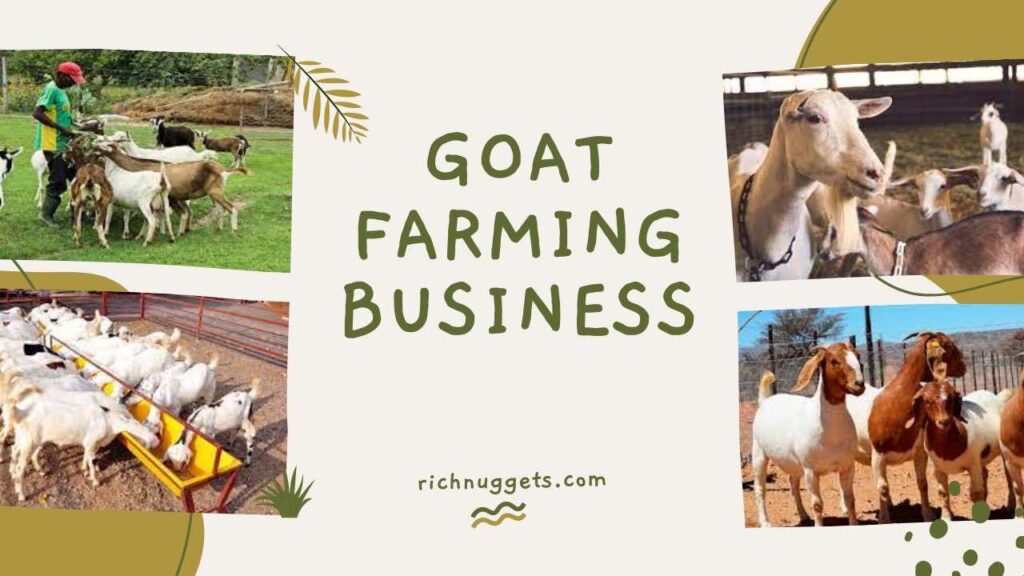
If you are thinking about the best husbandry business to start in Nigeria, the Goat rearing business is among the top, if not the best.
The prevalent misconception surrounding the goat farming industry and agriculture in general in Nigeria is primarily rooted in a lack of knowledge.
Many perceive goat farming as a low-paying and stressful job.
So I believe reading this article, means you have made up your mind about becoming your own boss and have an interest in the commercial Goat farming business in Nigeria.
In this article, I will touch on all essential aspects that will make you start a profitable goat husbandry business.
I might be referring more to the goat farming business in Nigeria, but everything I share here is universally applicable. “That’s probably the best thing I love about the agricultural business.”
There is a large market for goat meats in Nigeria, which makes it a very profitable venture in Nigeria.
But if we are to take a global demand view; goat meats are globally accepted, which makes it a more viable item for exportation if the demand arises.
According to Statistics, no less than 5 million people eat goat meat in Nigeria monthly.
And the supply of goat meat in Nigeria can’t meet up with the demand so billions of naira are spent yearly on the importation of goats from Chad, Niger, Cameroon, etc just to meet up the demand.
Meaning, that the market is very much open to accommodate every single person who shows interest.
One amazing thing about the goat business is that it is a low-cost business that can be started with as low as N50,000
You can get a mature goat between N10,000 to N20,000 in rural areas in Nigeria. With N50,000, you can get two female goats and a male goat to start with.
In this article, I won’t only be educating you on how to start a goat farming business in Nigeria, but also on the ways you can make money from the Goat farming business
Table of Contents
1. Secure Your Goat pen
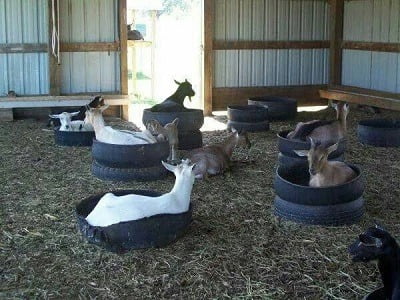
Goat Pen (goat house) is a very important aspect of commercial goat rearing business, except your plan for your goats is to live with you in your apartment.
The major reason for the goat pen is for safety from the weather; “rain (because goats hate to get wet), and sunning weather”.
Also, It is important that the pen is built into various segments because of the difference in breeds, and the sex of goats.
The separation within the pen must be spacious enough to contain each number of goats put into it because they like their privacy,
The separation is mostly important when you are running a commercial goat farming business.
Remember for more safety of your goats, put a guard dog or dogs to live with them in the pen. With the guard dog’s presence, the goat will be safe from predators.
According to dog experts, the best way to make a guard dog familiar with the goat is to take the dog when it is still very young from the mother to live in the same pen with the goats.
2. Fence The environment:
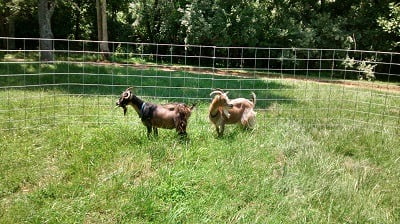
The next important thing to do after completing the goat pen is to construct a fence around the pasture to keep the goat within a parameter.
The fence should be a brief perimeter fence made with barbwires. By so doing the fence can also keep off dangerous animals like wolves, foxes, coyotes, etc.
One way to keep the goats away from the fence is to create a play zone for them because they love climbing a lot.
3. Feeding
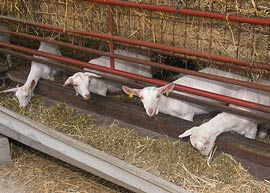
It’s important the landmass used for your goat farming business isn’t that far away from the city and is additionally large enough to accommodate your goat grazing needs
Apart from the grazing feed, try and feed them some high proteinous food and vitamins to keep them healthy always.
Using high-quality, fresh, nutritious food, and vitamins regularly when feeding them can help you achieve maximum production from your business.
Urea is toxic to goats, so never include it in their food rather give your goats 12%-18% protein feed. That’s a major requirement you must fulfill to become a successful commercial farmer.
Not leaving out the supply of fresh and clean water (automatically or manually) is an essential element of their health
Goat feeding is not just limited to grasses as they can also eat kitchen waste, stalk from beverage companies, roughage, agricultural waste, etc. This is why it is less expensive to rear a healthy goat or goats
Feeding your goat twice a day is the recommended number of times to feed your goats mostly when you are into commercial goat farming.
4. Goat Breeds:
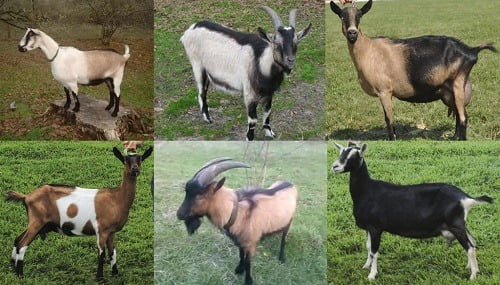
Deciding on rearing the proper goat breeds is dependent on what is available and demanded in your country.
There are various goat breeds such as; pygmy goats, Nigerian dwarf goats, Lamancha goats, Alpine goats, Nubian goats, Boer goats, and many others.
In all these different types of goat breeds, what matters most to succeed in this goat farming business is to pick the proper goat breed or breeds that fit your market needs.
If you are in a country whose demand for goat meat is higher than the demand for goat milk, “like in Nigeria”, I advise you to rear goats that can give more meat and can well adapt to the country’s weather.
Likewise, if you intend to go into dairy (milk) production.
5. Veterinary Service
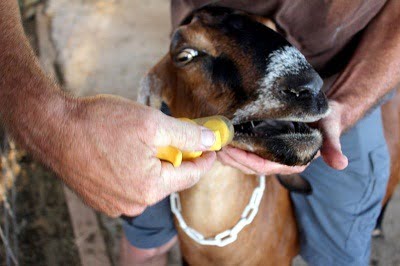
Veterinarians are people who treat animals, just like doctors.
Some farmers may feel less need for their services because of their poor husbandry knowledge and the idealogy of; “I can do it all myself.”
If you intend to run commercial goat farming, you definitely need to sign up for a veterinary service close to you, that you can call when you notice any strange thing among your goats.
Early treatment helps to prevent the spread of ailment from one goat to the other.
And also a stock-up of some necessary medicines and vaccines will help remedy any symptoms or sickness before the veterinary doctor shows up with the final solution.
Constant check-ups and vaccination from veterinary doctors will decrease the death rate and increase the lifespan of your goats.
6. Marketing
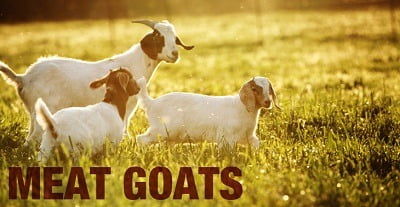
If profit-making is the reason at which you want to engage in this husbandry business then you must pay attention to this marketing strategy.
Before starting a goat farming business, you must have analyzed your local market so your products meet the exact demand of your Country’s market.
If it is goat milk that has a high demand in your Country, then a dairy goat farming business is what you must focus on more.
But if it’s goat meat that has high demand like in Nigeria, you must focus on rearing goats that produce more meat.
And also your market knowledge (particularly marketing strategies) can maximize your revenue.
Remember Goat demand is acceptable by all. So, don’t just limit your sales to your local market, take advantage of the international market too.
7. Management
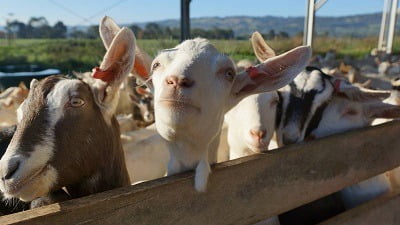
Management comprises the ability to organize the goat farm business efficiently and effectively.
The ability to put everything that I have said so far to good use is what management is all about.
With the current shortages in demand, the goat industry is open to all who find interest in it.
And as your goats continue to multiply expansion should always be in mind.
The expansion comprises both in land and more employees.
Make sure your workers are trustworthy and there is a good relationship with them.
I would have loved to say; “that is all there is in starting a profitable goat farming business, but it isn’t.” So please do yourself a favor by having practical training.
The only way to get this practical training is to sign up at any established goat farm close to you where the owner has been in the business for at least 3 years.
Things to Look Out For in Your Goats Health and Little Remedy Tips
Animals are vulnerable to worms. The following types of worms are common in goats are:
Tape Worm Symptoms:
The symptoms of this disease include fever, slow growth of animals, and goat kid mortality.
Prevention Measure: Carry out periodic deworming for all goats in the shed.
Roundworm Symptoms:
This parasitic disease can cause fever, a slow rate of animal growth, anemia, and edema in the lower jaws of goats.
Prevention Measure: Make sure all animals are dewormed periodically.
Lice and Tick Symptoms:
This parasitic infestation can cause skin allergies and slow growth in growing animals.
Prevention Measure: Clean the goat house regularly and keep the floor always dry.
Foot Rot Symptoms:
Usually, this causes wounds in the goat’s foot.
Prevention Measure: Make sure to maintain the dry conditions in the goat shed.
Pregnancy Problems:
Pregnancy Toxemia and abortions are common problems found during the pregnancy period. Pregnancy Toxemia is caused by late pregnancy, especially in the last 2 weeks period.
This happens with goats carrying multiple kids. However, abortions in pregnant goats are caused by nutritional problems and infectious problems.
Ways you can make money from the Goat farming business
One other amazing thing about goat farming is, it provides several opportunities you can make money from such as:
Goat meat
Goat meat is the obvious source of income that most people know about they talk about how to make money from the goat husbandry business.
We all know how goat meat is consumed either in soup, stew, fried, or dried.
Goat meat is highly nutritious and the most preferred because it contains very low fat and is easy to digest when compared to other meats
With Nigeria’s population over 150 million, over 1 million people living in Nigeria consume goat meat every day.
And most farmers rear goats just for meat.
Milk
Goat milk is a highly nutritious product that is used for by-products like yogurt, milk, cheese, butter, soap, etc,.
This unpopular business opportunity in goat rearing in Nigeria generates very high income for several goat farmers in countries where goat milk production is booming.
In many countries all over the world, goat milk is wildly produced for household and commercial consumption.
But in Nigeria, hardly would you see any home consume goat milk, which is why the goat milk market value is very low.
Nevertheless, due to the small fat globules and homogenization found in goat milk, it is easy to digest than cow milk.
It also helps in improving an individual’s appetite and digestive efficiency.
It is your choice to boil goat milk as it is bactericidal(antibiotics).
The amount of milk depends on the goat breed. The best ones can produce up to 4 liters of milk per day.
Hides and skin
Every breed of goats produces hides and skin, which can serve or use in the production of leather items.
Black Bengal goats or Kalahari Red goats are the best breed of goats that produce high-quality hides and skin.
If you intend to deal in goat hides and skin, you can also start the business.
Wool
Goat wool is used in the production of fabrics, carpets, and knitwear.
Some types of goats give the valuable kind of wool called; “cashmere.”
When compared with sheep wool, goat fly-wool products are lightweight, soft, and very demanding (which makes them expensive)
Fibers
Some breeds of goats like the Cashmere and Angora can produce high-quality fibers. These can also be sold for maximum profit.
Manure
Most farmers love and prefer to use organic manure than using artificial fertilizers to grow their crops.
Goats’ feces are highly organic manure (fertilizers) that can be used for farm crops.
So you can always apply the feces to your farmland if you decide to also go into crop farming.
Now that we have known all this, it is important to now know the essential knowledge before starting a profitable Goat farming Business in Nigeria.
Advantages of Starting a Goat Farming Business
- Low startup capital.
- Low labor is required.
- Employment (employer of labor)
- Source of food.
- A good source of protein.
- Good source of Farm manure.
- Not limited by seasons.
- All goat breeds can feed and share the same environment as cattle.
- Can serve as an export.
Health Benefits of Goats
Goat products, including meat (chevon or goat meat), milk, and other derivatives, offer several health benefits.
Here are the health benefits associated with consuming goat products:
- Lean Protein Source: Goat meat is a good source of lean protein, essential for muscle building, repair, and overall body function. It provides a high-quality protein with lower fat content compared to some other meats.
- Rich in Vitamins and Minerals: Goat meat is rich in essential vitamins such as B12, which is crucial for nerve function and the formation of red blood cells. It also contains minerals like iron, zinc, and phosphorus, important for various physiological processes.
- Low Cholesterol Content: Goat meat generally has lower cholesterol levels compared to some other meats. Including goat meat in a balanced diet may contribute to maintaining healthy cholesterol levels.
- Easier Digestibility: Goat milk is often considered more digestible than cow’s milk, making it a suitable option for individuals who may be lactose intolerant. It has smaller fat globules and a protein structure that some people find easier to digest.
- Bone Health: Goat milk is a good source of calcium, which is essential for maintaining strong and healthy bones. It also contains phosphorus and magnesium, contributing to overall bone health.
- Boosts Immune System: Goat milk contains selenium, an antioxidant that supports the immune system by protecting cells from damage. Additionally, it provides vitamins A and C, which are known to boost immune function.
- Management of Anemia: Goat meat is a rich source of iron, a key component in the formation of hemoglobin. Including goat meat in the diet can help prevent and manage iron-deficiency anemia.
- Heart Health: Goat products contain nutrients like potassium and unsaturated fats that may contribute to heart health. Potassium helps regulate blood pressure, and moderate consumption of unsaturated fats can be part of a heart-healthy diet.
- Suitable for Special Diets: Goat products are often consumed by individuals who follow specific dietary patterns, such as halal or kosher diets. Goat meat is also a common protein source in various traditional and cultural cuisines.
- Good Source of Conjugated Linoleic Acid (CLA): Goat meat contains CLA, a type of fatty acid that has been associated with potential health benefits, including anti-inflammatory and anti-cancer properties.
- Natural Probiotics: Goat milk contains probiotics, which are beneficial bacteria that support gut health. These probiotics may aid digestion and contribute to a healthy gut microbiome.
- Hydrating Properties: Goat milk has a high water content, contributing to hydration. It can be a valuable addition to the diet, especially in regions where access to clean water may be limited.
Types Of Goats Used For Goat Farming In Nigeria
In Nigeria, several types of goats are commonly used for goat farming, each with its unique characteristics and suitability for specific purposes.
Here are some of the commonly raised goat breeds in Nigeria:
- West African Dwarf (WAD) Goat: Small to medium-sized, with a compact body. Coat color varies and can include black, brown, white, or spotted. Primarily kept for meat production, adaptable to various agro-ecological zones.
- Sokoto Red (Maradi) Goat: Medium to large-sized, with a distinctive red coat. Long, drooping ears and a convex facial profile. Raised for meat production, well adapted to arid and semi-arid regions.
- Kano Brown Goat: Medium-sized with a brown coat. Both sexes have horns, and the ears are semi-pendulous. Primarily kept for meat production, well-suited to the northern regions of Nigeria.
- Pygmy Goat: Small-sized, compact build, with a variety of coat colors. Often has a friendly and docile temperament. Commonly kept as a pet, but also raised for meat production. Suitable for small-scale farming.
- Boer Goat: Large-sized with a distinctive white body and a reddish-brown head. Well-muscled and adaptable. Mainly raised for meat production, known for its fast growth rate and high meat yield.
- Anglo-Nubian Goat: Medium to large-sized with long ears and a convex facial profile. Coat color varies, and they often have a distinctive Roman nose. Primarily kept for milk production, known for high butterfat content in the milk. Also suitable for meat production.
- Toggenburg Goat: Medium-sized with a distinctive brown coat and white markings. Erect ears and a straight facial profile. Primarily raised for milk production, known for its high milk yield and adaptability.
- Saaneen Goat: Large-sized with a white coat and erect ears. They have a calm temperament. Mainly kept for milk production, known for high milk yield and good butterfat content.
- Crossbred and Improved Breeds: Crosses between indigenous breeds and exotic breeds, or selective breeding to improve specific traits. Often bred for improved meat or milk production, combining desirable traits from different breeds.
The Rearing & Breeding Seasons For Goats In Nigeria
The rearing and breeding seasons for goats in Nigeria can vary depending on the specific breed, climatic conditions, and local management practices.
However, here are some general guidelines that can be considered for the rearing and breeding seasons for goats in Nigeria:
Rearing Seasons:
- Dry Season (Late October to Early April): During the dry season, when pastures are generally more available, goats can be reared more easily. This period is marked by lower humidity and less rainfall, creating favorable conditions for grazing.
- Rainy Season (Late April to September): The rainy season may present some challenges for goat rearing due to potential issues such as parasite infestations and muddy conditions. However, with proper management and shelter, goats can still be raised successfully during this period.
- Year-round Rearing: In some regions with relatively consistent climates, goats can be reared year-round. This is often the case in areas where there is a continuous supply of forage, and the weather conditions are moderate throughout the year.
Breeding Seasons:
- Breeding in the Dry Season: For many goat breeds, the dry season is considered an ideal time for breeding. This is because the weather conditions are more favorable, and the availability of forage is generally better, contributing to improved reproductive performance.
- Breeding in the Rainy Season: While breeding during the rainy season may be less common due to potential challenges, it is still practiced in some regions. Proper management, including providing shelter and controlling parasites, can help facilitate successful breeding during this period.
- Year-round Breeding: Some goat farmers practice year-round breeding, allowing for a continuous production cycle. This approach requires careful management of breeding activities, nutrition, and health to ensure optimal reproductive performance.
It’s essential for you as a goat farmer to consider the specific conditions of your region, the breed of goats being raised, and your management practices when determining the most suitable rearing and breeding seasons.
Additionally, you should pay attention to the nutritional needs of the goats during different seasons and adjust their feeding strategies accordingly.
Types Of Equipment & Tools Used In The Goat Farming Business In Nigeria
Here are the types of equipment and tools used in goat farming:
- Fencing Materials: To secure the grazing area and protect goats from predators. E.g Barbed wire, chain-link fencing, electric fencing.
- Shelters and Housing Structures: Provide protection from harsh weather conditions. example Barns, sheds, pens, or simple three-sided shelters.
- Feeders: Efficient feeding to minimize wastage. Trough feeders, hay racks, hanging feeders.
- Watering Systems: Ensure a constant and clean water supply for goats. Automatic waterers, troughs, buckets.
- Milking Equipment: Used in dairy goat farming for milking. Milking machines, milking pails, teat dip cups.
- Healthcare and Veterinary Tools: Used for routine health checks and medical interventions.Such as; Syringes, needles, hoof trimmers, de-worming tools, thermometers.
- Breeding and Reproduction Tools: Aid in breeding management. Breeding harnesses, marking harnesses, ultrasound machines for pregnancy detection.
- Grooming and Cleaning Tools: Maintain the cleanliness and health of the herd. Brushes, combs, hoof picks, disinfectants, and cleaning tools.
- Weighing Scales: Monitor the weight of individual goats for health and growth assessment. Types; platform scales, hanging scales.
- Handling and Restraint Equipment: Assist in managing and restraining goats for various activities. Chutes, head gates, catch pens, and handling facilities.
- Record-Keeping Tools: Maintain accurate records for each goat. Notebooks, record sheets, computer software for farm management.
- Electricity Generators: Provide a reliable power source, especially in areas with frequent power outages. Diesel or petrol generators.
- Transportation Equipment: Transport goats to markets or veterinary clinics. Trailers, pickup trucks, or other suitable vehicles.
- Personal Protective Equipment (PPE): Ensure the safety of the farmer during various farm activities. Gloves, boots, coveralls, safety goggles.
- Feeding and Forage Equipment: Facilitate efficient feeding and forage management. Hay balers, forage harvesters, grain grinders.
The appropriate equipment needed depends on the scale and type of goat farming operation. Regular maintenance and proper use of these tools and equipment are essential for the overall success of your goat farm business.
Challenges of Starting a Goat Farming Business in Nigeria
Here are the challenges you will likely face when starting a goat farming business in Nigeria, and their potential solution:
- Disease Outbreaks: Goats are susceptible to diseases, leading to high mortality rates and economic losses.
Solution: Implement a strict health management plan, including regular vaccinations, quarantine procedures for new animals, and collaboration with a qualified veterinarian for timely disease diagnosis and treatment. - Inadequate Infrastructure: Limited access to essential infrastructure like reliable water sources, electricity, and good roads.
Solution: Invest in on-farm infrastructure development, explore alternative energy sources, and collaborate with local authorities for improvements in road networks and utilities. - Limited Access to Quality Feed: Inconsistent availability and affordability of quality feed.
Solution: Explore local feed alternatives, establish relationships with reliable feed suppliers, and invest in on-farm forage production. Implementing proper grazing management can also reduce dependency on external feed sources. - Predator Threats: Predators pose a threat to the safety of goats, especially in rural areas.
Solution: Install effective fencing, use guardian animals like dogs, and employ other security measures to protect the herd from predators. - Climate Variability: Unpredictable weather patterns affecting grazing land and herd health.
Solution: Develop water management strategies, implement rotational grazing, and have contingency plans for extreme weather conditions. Consider constructing shelters to protect goats from adverse weather. - High Mortality Rates: High mortality rates, especially among kids, due to diseases and poor management practices.
Solution: Implement proper breeding practices, provide adequate nutrition to pregnant and nursing does, and ensure timely intervention in case of health issues. Implement biosecurity measures to prevent the introduction of diseases. - Limited Access to Markets: Difficulty in finding reliable markets for goat products.
Solution: Develop a network with local markets, restaurants, and potential buyers. Utilize digital platforms and social media for marketing. Consider forming cooperatives with other farmers to strengthen market presence. - Lack of Financial Support: Limited access to capital for initial investment and ongoing expenses.
Solution: Explore agricultural financing options, engage with government agricultural support programs, and consider partnerships with financial institutions. Develop a detailed business plan to attract potential investors. - Inadequate Training and Education: Lack of knowledge in modern goat farming practices.
Solution: Attend training programs, workshops, and engage in continuous learning. Join local and online agricultural communities to exchange knowledge and experiences. Seek mentorship from experienced goat farmers. - Government Regulations: Navigating complex regulatory requirements and obtaining necessary permits.
Solution: Stay informed about agricultural regulations, engage with relevant government agencies, and seek assistance from agricultural extension services. Ensure compliance with all necessary permits and standards. - Theft and Security Concerns: Vulnerability to theft, especially in rural areas.
Solution: Implement security measures, such as proper fencing, surveillance systems, and collaboration with local law enforcement. Community engagement and vigilance can also deter theft. - Market Price Fluctuations: Prices of goat products subject to market fluctuations.
Solution: Diversify income streams, explore value-added products, and establish long-term contracts with reliable buyers. Stay informed about market trends and adjust production levels accordingly.
Note: These challenges must be addressed through proactive measures and strategic planning in other to sustain the success of your goat farming business in Nigeria.
Recommended articles:
- Rice Business in Nigeria Made Easy
- Poultry farming business in Nigeria.
- Pig farming business in Nigeria
- 10 Money-Making Agriculture Business Ideas
- How to start Agriculture Business
Conclusion
Remember, success in goat farming requires dedication, proper planning, and continuous learning.
Regularly assess and adjust your strategies to adapt to changing market conditions.
With this comprehensive knowledge so far, you can start a profitable goat farming business in Nigeria.
Remember to drop your questions or contributions in the comment section below.
Be a Lifter via the share buttons to those out there that could be in need of such business knowledge.
Remember to turn on the Bell 🔔 Notification icon to get updated on new content.
Discover more from StartBizEasy
Subscribe to get the latest posts to your email.






I like this goat business
Very much enlighten, with the new ideas I have about goats farming,I must start the business, thank you
Thank you very much, how many months does it take for a pregnant goat to born
5 months on an average